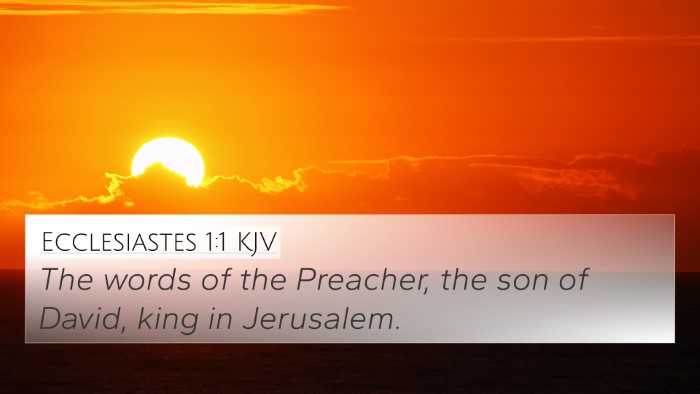Understanding Proverbs 1:1
Proverbs 1:1 states: "The proverbs of Solomon the son of David, king of Israel." This verse serves as an introduction to the entire book of Proverbs, establishing its authorship and purpose.
Author and Context
The verse identifies Solomon as the author, renowned for his wisdom, which he sought through the fear of the Lord. This establishes credibility and highlights the value of the teachings that follow.
- Matthew Henry emphasizes the importance of Solomon’s role not only as a king but as a wise teacher, whose lessons are meant to guide and instruct.
- Albert Barnes notes that Solomon addressed this collection of proverbs to the youthful, aiming to equip them with wisdom and understanding, crucial for a successful life.
- Adam Clarke points out that Solomon's proverbs contain practical advice that remains applicable across generations, reflecting timeless truths about human behavior and divine principles.
Purpose of the Proverbs
The book of Proverbs is designed to impart wisdom, instruction, and knowledge, aiding readers in discerning right from wrong. These concepts are foundational in both personal and communal contexts.
Biblical Cross-References
This verse connects with various other Scriptures, highlighting the interconnectedness of biblical wisdom:
- Ecclesiastes 1:1 - Another work by Solomon reflecting on life’s meaning.
- Proverbs 1:7 - "The fear of the Lord is the beginning of knowledge." This reinforces that wisdom begins with reverence for God.
- 1 Kings 3:5-12 - God's granting of wisdom to Solomon showcases the source of Solomon’s insight.
- Proverbs 4:7 - "Wisdom is the principal thing; therefore get wisdom." A reminder that wisdom is of utmost importance.
- James 1:5 - Encourages seeking wisdom from God, a theme echoed throughout Proverbs.
- Proverbs 2:6 - "For the Lord gives wisdom; from His mouth come knowledge and understanding." This emphasizes the divine origin of wisdom.
- Psalm 111:10 - Affirming that “The fear of the Lord is the beginning of wisdom.”
- Proverbs 9:10 - Echoes the notion that knowledge of the Holy One is understanding.
- Luke 2:52 - Describes Jesus growing in wisdom, paralleling Solomon's teachings on wisdom.
- Romans 12:2 - Calls for transformation and renewal of the mind, aligning with the wisdom-focused mentality of Proverbs.
Connection with Other Verses
The guide of Proverbs, particularly Solomon’s wisdom, forms thematic links between multiple Biblical texts. For example, seeking wisdom is a common theme in both the Old and the New Testaments, advocating for discernment in decision-making.
Cohesive Themes:
- Wisdom and Understanding: The consistent call for wisdom in Proverbs resonates with Colossians 2:2-3, which speaks of treasures of wisdom and knowledge in Christ.
- Righteous Living: Proverbs’ teachings on uprightness is echoed in Matthew 5:16, encouraging good works to glorify God.
- Value of Instruction: Referencing 2 Timothy 3:15, which highlights the scriptures' ability to make one wise for salvation.
Tools for Deepening Understanding
Utilize various resources to deepen your understanding of Proverbs 1:1, including:
- Bible Concordance: A helpful tool to locate and compare terms across different scriptures.
- Bible Cross-Reference Guide: Assists in linking related verses for a comparative study.
- Bible Cross-Reference System: A structured approach to uncovering thematic ties within the scriptures.
- Comprehensive Bible Cross-Reference Materials: Utilize resources for rich insights and connections.
- Cross-reference Bible Study Methods: Seek methods that incorporate thematic analysis, character studies, and more.
Conclusion
Proverbs 1:1 sets the stage for a profound exploration of wisdom throughout the book, encouraging readers to seek and apply practical knowledge in their lives. The interconnectedness of the Scriptures, as seen through various cross-references, deepens one’s understanding of divine wisdom, illustrating how the teachings resonate across both the Old and New Testaments, offering timeless guidance for righteous living.













